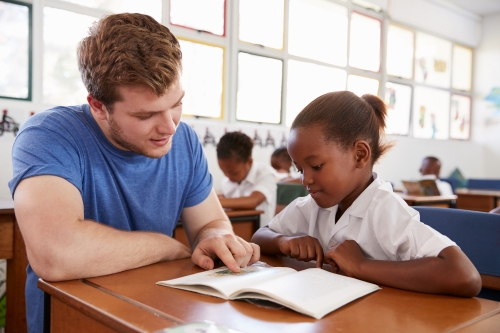Cultivating a Culture of Safety

Joa lives with his mother and elderly grandparents in a simple one-room dwelling. They have no electricity or running water in the home and rely on the village well. Joa has one T-shirt and a pair of shorts and often feels cold at night. His mother suffers from addictive behaviours and at times spends the family money on alcohol, so Joa sometimes relies on neighbours for food. His elderly grandparents show him love but are very frail so are unable to work and provide for Joa's needs. Joa attends a Christian school and loves going there. His teachers are kind and teach him well, often praising him for his hard work. The school provides him with a healthy meal every lunch time. His teacher listens to him attentively whenever Joa shares his problems; he feels heard and valued. His teachers often tell him about Jesus and prays for the students. Joa is interested in this Jesus.
Meanwhile Dee lives in a large city in SE Asia. Her parents are loving, kind and supportive. She lives in a small but clean home and loves spending time with her parents every evening. However, Dee dreads going to her Christian school. There's constant bullying in the school corridors, bullying which is ignored by the teachers. One time she told the school nurse about an older student who was hurting a younger student, but the school nurse told her to stop telling tales. Her teachers are always complaining about the school and saying rude things about the leadership. Although some of the teachers can be nice, others shout and shame students. There is no consistency. It is so confusing, as these same teachers then sing praises to Jesus in assembly. Why would she want to believe in this Jesus?
As teachers in our educational contexts, are we creating a culture of safety for students within our school communities and pointing them towards Jesus? How do we know this? Have we ever asked our students if they feel safe? Can we say we are Christ-centred if we are not creating safe environments where children have access to Jesus and are not hindered from Him?
Our students come from all sorts of different backgrounds and situations. As teachers, we cannot control all the risk factors our students encounter at home, in their communities or online. Sometimes it can feel so hopeless when we know that some of our students are not in good home environments and there are limited child protective resources. But we can ALWAYS “do something”. We can increase the protective factors around our students through cultivating a culture of safety in our school. The stories above show clearly how impactful a Christ-like, safe school culture can be for children.
So how we cultivate a culture of safety within a school?
Here are some questions you can ask yourself:
Does my school
- have excellent, safe recruitment and onboarding procedures to ensure all staff are passionate about valuing and safeguarding children?
- have a clear, easy to read and understand safeguarding policy that all the staff have signed compliance to?
 have regular safeguarding training and conversations for our students and all our staff?
have regular safeguarding training and conversations for our students and all our staff?- have a “raising a concern” process that students and staff trust?
- have a trusted, compassionate, professional process to respond to all safeguarding concerns?
If so, that’s wonderful. Please support those policies and procedures and encourage others to do so. If not, bring this topic up to your school leadership, and feel free to reach out to us! That’s why we are here! Our safeguarding team can partner with you and support the development of excellent, holistic safeguarding programmes within your school. We can assess what you already have and give you further resources to make any needed improvements. Write to us at safeguarding@teachbeyond.org!
And, here are some more personal questions to reflect on:
Do I…
- reflect Jesus in my conduct, manner and attitude and apologise, seek forgiveness, and demonstrate a growth attitude when I don’t?
- fully understand that safeguarding my students is my responsibility and take all safeguarding training and compliance to the TeachBeyond policy and code of conduct seriously?
- promote the safety and wellbeing of all children whether in TeachBeyond or outside the organization?
- listen and respond compassionately and professionally to the views and concerns (verbal or non-verbal) of children particularly if they communicate that they do not feel safe or well?
- consider and respect the diverse background and needs of children and their families and not ever discriminate against any child or their family members or show favouritism?
 follow the safeguarding conduct principles of visibility, accountability and/or power balance (VAP) in all my interactions with children, modelling healthy and safe adult-child relations?
follow the safeguarding conduct principles of visibility, accountability and/or power balance (VAP) in all my interactions with children, modelling healthy and safe adult-child relations?- communicate and use media following safeguarding conduct principles, legal requirements and representing children, their local culture and environment in a manner of honesty, dignity, and respect?
- immediately raise any safeguarding concerns, including bullying, to the correct person?
Let us finish with a final story: At one school, unknown to the teachers & staff, a teenage student was being seriously abused, physically and emotionally, at home. One of the reasons he finally disclosed this abuse was due to his teachers, and one in particular. This teacher always greeted him by name with a smile, made eye contact when she spoke to him, showing him value and dignity, and cared about his academic growth. Another reason he disclosed was that he knew he would be listened to, believed, cared for and supported throughout the response. This boy was not a Christian, but his teachers and the school culture at large reflected Jesus, and he was impacted. The way YOU conduct yourself as a teacher can make life-altering differences.
One of TeachBeyond’s values is Love: Embracing our identity as a people who are loved by our Creator, we seek to love the Lord with all our heart, soul, mind, and strength. Similarly, we commit to loving each other and the world around us, learning to do good, seek justice, and correct oppression.[1] May we as TeachBeyond members do everything we can to value, protect, and love our students, seeking to notice and respond well to anything that causes them harm and cultivating holistic cultures of safety within our classrooms and school communities where children develop, thrive, and learn who Jesus is.
TeachBeyond’s Safeguarding Team
TeachBeyond’s Global Safeguarding team is made up of individuals who desire to see children and vulnerable adults cared for in a safe, nurturing, transformational environment. Feel free to reach out to them at safeguarding@teachbeyond.org if you have any questions or concerns about harm to children.
[1] See TeachBeyond’s Core Values: https://teachbeyond.org/learn/mission-vision
Photo Credits
First Day of School. Shutterstock. Resized.
Teacher in Front of Class. Shutterstock. Resized.
Volunteer Teacher. Shutterstock. Resized.
